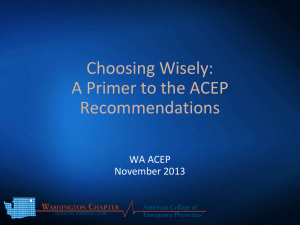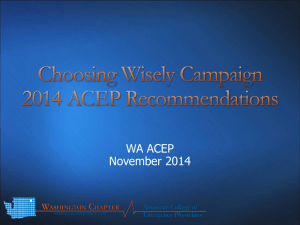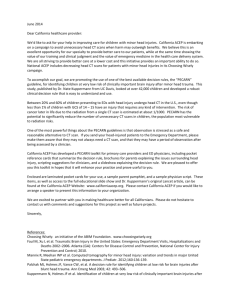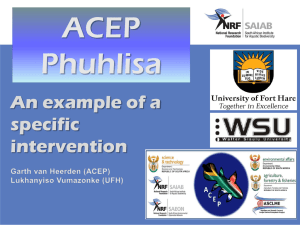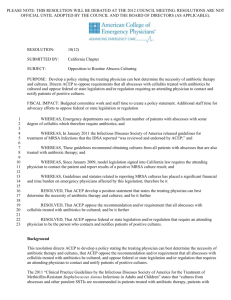AMERICAN COLLEGE OF EMERGENCY PHYSICIANS
advertisement
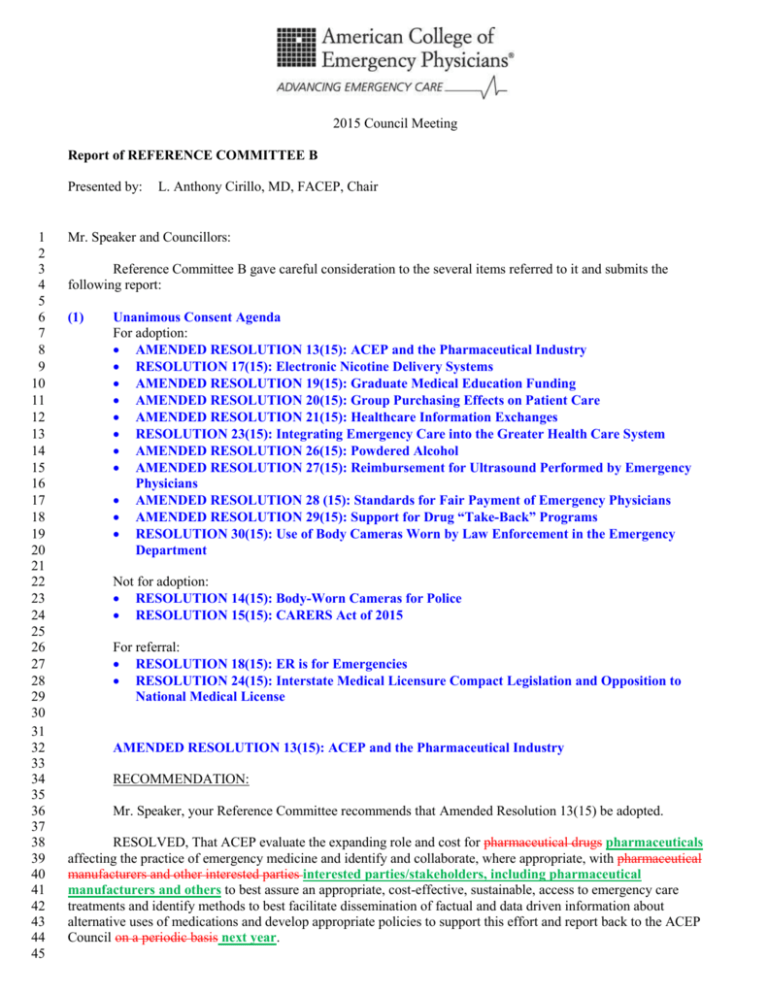
2015 Council Meeting Report of REFERENCE COMMITTEE B Presented by: 1 2 3 4 5 6 7 8 9 10 11 12 13 14 15 16 17 18 19 20 21 22 23 24 25 26 27 28 29 30 31 32 33 34 35 36 37 38 39 40 41 42 43 44 45 L. Anthony Cirillo, MD, FACEP, Chair Mr. Speaker and Councillors: Reference Committee B gave careful consideration to the several items referred to it and submits the following report: (1) Unanimous Consent Agenda For adoption: AMENDED RESOLUTION 13(15): ACEP and the Pharmaceutical Industry RESOLUTION 17(15): Electronic Nicotine Delivery Systems AMENDED RESOLUTION 19(15): Graduate Medical Education Funding AMENDED RESOLUTION 20(15): Group Purchasing Effects on Patient Care AMENDED RESOLUTION 21(15): Healthcare Information Exchanges RESOLUTION 23(15): Integrating Emergency Care into the Greater Health Care System AMENDED RESOLUTION 26(15): Powdered Alcohol AMENDED RESOLUTION 27(15): Reimbursement for Ultrasound Performed by Emergency Physicians AMENDED RESOLUTION 28 (15): Standards for Fair Payment of Emergency Physicians AMENDED RESOLUTION 29(15): Support for Drug “Take-Back” Programs RESOLUTION 30(15): Use of Body Cameras Worn by Law Enforcement in the Emergency Department Not for adoption: RESOLUTION 14(15): Body-Worn Cameras for Police RESOLUTION 15(15): CARERS Act of 2015 For referral: RESOLUTION 18(15): ER is for Emergencies RESOLUTION 24(15): Interstate Medical Licensure Compact Legislation and Opposition to National Medical License AMENDED RESOLUTION 13(15): ACEP and the Pharmaceutical Industry RECOMMENDATION: Mr. Speaker, your Reference Committee recommends that Amended Resolution 13(15) be adopted. RESOLVED, That ACEP evaluate the expanding role and cost for pharmaceutical drugs pharmaceuticals affecting the practice of emergency medicine and identify and collaborate, where appropriate, with pharmaceutical manufacturers and other interested parties interested parties/stakeholders, including pharmaceutical manufacturers and others to best assure an appropriate, cost-effective, sustainable, access to emergency care treatments and identify methods to best facilitate dissemination of factual and data driven information about alternative uses of medications and develop appropriate policies to support this effort and report back to the ACEP Council on a periodic basis next year. Reference Committee B Page 2 46 47 48 49 50 51 52 53 54 55 56 57 58 59 60 61 62 63 64 65 66 67 68 69 70 71 72 73 74 75 76 77 78 79 80 81 82 83 84 85 86 87 88 89 90 91 92 93 94 95 96 97 98 99 100 Testimony Limited testimony was heard that working strictly with the pharmaceutical industry would not be fruitful, and ACEP should work with a larger group of stakeholders to advocate for cost-effective access to pharmaceuticals used in emergency medicine practice. RESOLUTION 17(15): Electronic Nicotine Delivery Systems RECOMMENDATION: Mr. Speaker, your Reference Committee recommends that Resolution 17(15) be adopted. RESOLVED, That ACEP support legislative and regulatory efforts to control the use of electronic nicotine delivery systems and regulate the toxicity of vapor(s) produced for primary and second hand exposures; and be it further RESOLVED, That ACEP develop recommendations for tobacco and nicotine cessation that avoid the use of unregulated electronic nicotine delivery systems; and be it further RESOLVED, That ACEP promote awareness of the risk of primary inhalation injury and direct toxicity from electronic nicotine delivery systems to ACEP members and the physician community as a whole. Testimony Limited but compelling testimony was heard regarding the benefits of encouraging patients to stop using tobacco products. Testimony was also heard regarding concerns with the use of unregulated electronic nicotine delivery systems. AMENDED RESOLUTION 19(15): Graduate Medical Education Funding RECOMMENDATION: Mr. Speaker, your Reference Committee recommends that Amended Resolution 19(15) be adopted. RESOLVED, That ACEP create a policy statement supporting that all funding distributed to institutions for the purpose of graduate medical education be used solely for that purpose; and be it further RESOLVED, That ACEP work with the agencies that provide graduate medical education funding to create measures to ensure that all institutions that receive graduate medical education funding be required to maintain publicly available records of the distribution and utilization of these funds. Testimony Testimony was heard from individuals involved with GME training that the first Resolved could potentially reduce funds for GME programs that were available from outside sources. Testimony was unanimous on the need for greater transparency on how the funds are used. AMENDED RESOLUTION 20(15): Group Purchasing Effects on Patient Care RECOMMENDATION: Mr. Speaker, your Reference Committee recommends that Amended Resolution 20(15) be adopted. Reference Committee B Page 3 101 102 103 104 105 106 107 108 109 110 111 112 113 114 115 116 117 118 119 120 121 122 123 124 125 126 127 128 129 130 131 132 133 134 135 136 137 138 139 140 141 142 143 144 145 146 147 148 149 150 151 152 153 154 155 RESOLVED, That ACEP develop a policy statement on the effects that group purchasing has on medication shortages and use of orphan devices in the emergency departments; and be it further RESOLVED, that ACEP study the effects on patient care from the lack of availability of appropriate medications and medical equipment due to group purchasing practices, medication shortages, and orphan product restrictions. RESOLVED, That ACEP work with stakeholders such as the American Medical Association to develop model legislation that protects physicians and pharmacists from liability as a result of the inability to provide adequate equipment optimal care due to lack of appropriate medical devices or pharmaceuticals to diagnose and treat emergency patients.; and be it further RESOLVED, That ACEP create a list of “never events” as it relates to orphan devices and drug shortages. Testimony Limited testimony was heard supporting the need for legislation, but there was consensus that emergency physicians should not be held legally accountable when appropriate pharmaceuticals and equipment are not available to them in the ED. Testimony was also given that creation of a list of “never events” could be problematic for physicians. AMENDED RESOLUTION 21(15): Healthcare Information Exchanges RECOMMENDATION: Mr. Speaker, your Reference Committee recommends that Amended Resolution 21(15) be adopted. RESOLVED, That ACEP create a recommended standard minimum amount of information to be contained in the Healthcare Information Exchanges; and be it further RESOLVED, That ACEP promote the standardized requirements to the Healthcare Information Exchanges currently in the process of development. Testimony It was noted that as users of HIE, ACEP members have a vested interest in HIEs at the national and local level. In emergency medicine, it is critical to have health information that crosses healthcare delivery settings in realtime fashion. There was overall support but concern over the minimum data set, when additional information may be necessary at the point of care but unavailable. It was also noted the ability of HIEs to push notifications to emergency physicians within their own EHR at the point of care was essential to avoid the distraction of logging onto a separate HIE system. RESOLUTION 23(15): Integrating Emergency Care into the Greater Health Care System RECOMMENDATION: Mr. Speaker, your Reference Committee recommends that Resolution 23(15) be adopted. RESOLVED, That ACEP pursue reimbursement strategies to promote care coordination in the Emergency Department; and be it further RESOLVED, That ACEP promote reimbursement strategies to incentivize ED’s to perform intensive case management to optimize ED utilization for high utilizers; and be it further Reference Committee B Page 4 156 157 158 159 160 161 162 163 164 165 166 167 168 169 170 171 172 173 174 175 176 177 178 179 180 181 182 183 184 185 186 187 188 189 190 191 192 193 194 195 196 197 198 199 200 201 202 203 204 205 206 207 208 209 RESOLVED, That ACEP promote effective ED information sharing systems across health systems to facilitate care coordination and effective resource utilization. Testimony Unanimous testimony was heard regarding the need for emergency physicians to have incentives built into current and evolving payment systems to recognize the work they perform in coordinating care and providing support for care transitions for many of their patients. The committee heard testimony that the college is actively working on this issue. AMENDED RESOLUTION 26(15): Powdered Alcohol RECOMMENDATION: Mr. Speaker, your Reference Committee recommends that Amended Resolution 26(15) be adopted. RESOLVED, That ACEP supports banning the production, sale, distribution or possession of powdered alcohol for personal consumption use; and be it further RESOLVED, That ACEP request that the FDA ban powdered alcohol; and be it further RESOLVED, That ACEP request the Alcohol and Tobacco Tax Trade Bureau (TTB) to reverse its decision on Palcohol; and be it further RESOLVED, That ACEP endorse and support S.728/H.R. 1717, which would ban the production, sale, distribution or possessions of powdered alcohol; and be it further RESOLVED, That ACEP support legislation to ban the production, sale, distribution, or possession of powdered alcohol on a state level for personal consumption use. Testimony Overwhelming testimony was heard in support of the resolution to ban powdered alcohol for personal consumption. The resolution was amended to remove the reference to the specific bill because the other provisions of the bill and status of the bill at the present time are unknown. However, the spirit of the resolution that ACEP support legislation that bans the production, sale, distribution or possession of powdered alcohol is preserved. AMENDED RESOLUTION 27(15): Reimbursement for Ultrasound Performed by Emergency Physicians RECOMMENDATION: Mr. Speaker, your Reference Committee recommends that Amended Resolution 27(15) be adopted. RESOLVED, That ACEP issue develop a statement declaring that insurance companies and other payers reimburse emergency physicians for ultrasound studies and services that they perform and interpret as part of separate and identifiable procedures while providing patient care services in the Emergency Department; and be it further RESOLVED, That ACEP support efforts to reduce payment denials for appropriately performed and documented clinical ultrasonography. Reference Committee B Page 5 210 211 212 213 214 215 216 217 218 219 220 221 222 223 224 225 226 227 228 229 230 231 232 233 234 235 236 237 238 239 240 241 242 243 244 245 246 247 248 249 250 251 252 253 254 255 256 257 258 259 260 261 262 263 264 Testimony Unanimous testimony was heard in opposition to bundling payment into evaluation and management codes and in support of this resolution. AMENDED RESOLUTION 28(15): Standards for Fair Payment of Emergency Physicians RECOMMENDATION: Mr. Speaker, your Reference Committee recommends that Amended Resolution 28(15) be adopted. RESOLVED, That ACEP develop a set of standards for fair payment for Emergency Physician services, and compliance with which to be included in the next edition of America's Emergency Environment, A State by State Report Card;” and be it further RESOLVED, That ACEP devote increased resources to monitor the state-by-state status and changes in law concerning the standards for fair payment of Emergency Physicians and establish a single point of contact at the national level as a resource for assisting all chapters; and be it further RESOLVED, That ACEP shall work with other medical specialties, ambulatory services, and hospitals to develop Model Fair Payment Legislation and then devote resources to promoting adoption in every state; and be it further RESOLVED, That ACEP shall use its influence with the National Emergency Medicine Political Action Committee to devote resources to developing state-by-state influence upon each state’s legislative and regulatory process; and be it further RESOLVED, That ACEP work with the Emergency Medicine Foundation to research, publish, and disseminate the detrimental effects of legislation that limits the rights of emergency physicians to fairly bill and collect, and to develop effective educational materials explaining the facts concerning emergency physician billing and collection, for use at the national and local level in educating legislators, regulators, policy-makers, and the public; and be it further RESOLVED, That ACEP and the Emergency Medicine Action Fund develop and support explore the development of a national “strike team” that can be deployed by ACEP leadership to help chapters in states where emergency physicians are facing an immediate legislative threat to the fair payment process. Testimony Testimony reflected concerns with the growing trend by commercial payers to greatly reduce payment to emergency physicians, particularly those out of network. They also described increasingly aggressive efforts by the insurance industry working with state legislatures to ban balance billing for emergency physicians and expressed an urgency that ACEP increase resources to fight these trends. AMENDED RESOLUTION 29(15): Support for Drug “Take-Back” Programs RECOMMENDATION: Mr. Speaker, your Reference Committee recommends that Amended Resolution 29(15) be adopted. RESOLVED, That ACEP supports the requirement that pharmaceutical companies coordinate with hospitals to pay for appropriate hospital-located development of drug “take-back” programs at no cost to patients; and be it further Reference Committee B Page 6 265 266 267 268 269 270 271 272 273 274 275 276 277 278 279 280 281 282 283 284 285 286 287 288 289 290 291 292 293 294 295 296 297 298 299 300 301 302 303 304 305 306 307 308 309 310 311 312 313 314 315 316 RESOLVED, That ACEP endorses and supports local ordinances, state, and national laws that require drug “take-back” programs; and further be it RESOLVED, That the AMA Section Council on Emergency Medicine submit consider submitting a resolution to the American Medical Association to support drug “take-back” programs. Testimony Testimony strongly supported drug take-back programs, and some mentioned successful programs in their states that were administered by a variety of entities. There were concerns expressed about imposing requirements on the industry through support of legislation at local, state, and national levels. RESOLUTION 30(15): Use of Body Cameras Worn by Law Enforcement in the Emergency Department RECOMMENDATION: Mr. Speaker, your Reference Committee recommends that Resolution 30(15) be adopted. RESOLVED, That ACEP modify and extend its current policy statement “Recording Devices in the Emergency Department” to promote and endorse the expectation of patient privacy and limitations on recording devices by law enforcement personnel, visitors, and other individuals or organizations, during the provision of healthcare to patients in the emergency department; and be it further RESOLVED, That ACEP promote a position that institutions and physicians should restrict the use of recording devices during patient care and in areas in which discussions containing confidential, HIPAA-protected patient information are likely to occur within the Emergency Department. Testimony Testimony was heard in support of the importance of protecting patient privacy with current restrictions, but some noted that in circumstances of dangerous patients or events in the ED, video is important to protect staff. It was noted that ACEP’s Ethics Committee is currently addressing the issue of body cameras in the ED. RESOLUTION 14(15): Body-Worn Cameras for Police RECOMMENDATION: Mr. Speaker, your Reference Committee recommends that Resolution 14(15) not be adopted. RESOLVED, That ACEP believes that all armed police officers be equipped with and required to use bodyworn cameras; and be it further RESOLVED, That ACEP endorse and support local ordinances and state laws that require police officers to wear body-worn cameras. Testimony Most testimony was in opposition to ACEP taking a formal position on this issue, as it would not be appropriate for the College to make recommendations about requirements for other professions. Reference Committee B Page 7 317 318 319 320 321 322 323 324 325 326 327 328 329 330 331 332 333 334 335 336 337 338 339 340 341 342 343 344 345 346 347 348 349 350 351 352 353 354 355 356 357 358 359 360 361 362 363 364 365 366 367 368 369 RESOLUTION 15(15): CARERS Act of 2015 RECOMMENDATION: Mr. Speaker, your Reference Committee recommends that Resolution 15(15) not be adopted. RESOLVED, That ACEP endorse and support the CARERS Act of 2015; and be it further RESOLVED, That the AMA Section Council on Emergency Medicine submit a resolution to the AMA to endorse and support the CARERS Act of 2015. Testimony The majority of the testimony expressed concerns with several issues contained in the resolution and the underlying legislation. It was also noted that this Senate bill could be changed or amended, and ACEP should not provide support at this time. RESOLUTION 18(15): ER is for Emergencies RECOMMENDATION: Mr. Speaker, your Reference Committee recommends that Resolution 18(15) be referred to the ACEP Board of Directors. RESOLVED, That ACEP work with the American Medical Association and other interested parties to study the possibility of expanding the “ER is for Emergencies” program to a national scale. Testimony Authors of the resolution spoke about the great strides in care coordination that have been achieved through Washington State’s 7 Best Practices. They noted that they had been contacted by the Washington State Medical Society about implementing the best practices on a national level, but the authors wanted to bring the opportunity to the ACEP Council first. While there was widespread support for the concept of the 7 Best Practices, there was equally widespread distaste for the name “ER is for Emergencies.” Several noted that the perceptions and messaging around the 7 best practices must be consistent with ACEP’s support for the prudent layperson standard in all instances. Supportive testimony also cautioned that all 7 best practices may not be best for all states, and asked that ACEP consider piloting some or all of the best practices in additional states before rolling out all practices nationwide. ACEP Board members stated that the Board is working to address several issues highlighted by the 7 best practices and encouraged referral of this resolution to the Board. RESOLUTION 24(15): Interstate Medical Licensure Compact Legislation and Opposition to National Medical License RECOMMENDATION: Mr. Speaker, your Reference Committee recommends that Resolution 24(15) be referred to the ACEP Board of Directors. RESOLVED, That ACEP evaluate the proposed state legislative language, often referred to as the “Interstate Medical Licensure Compact,” allowing reciprocity by state physician licensing boards for board certified physicians, for its potential effect on emergency physicians’ practice and the potential for unintended consequences. Reference Committee B Page 8 370 371 372 373 374 375 376 377 378 379 380 381 382 383 384 385 386 387 388 389 390 391 392 393 394 395 396 397 398 399 400 401 402 403 404 405 406 407 408 409 410 411 412 413 414 415 416 417 418 419 420 421 422 423 424 Testimony Members of the ACEP Board stated that the State Legislative Regulatory Committee has an objective to address this issue. Additional testimony was heard both in favor of as well as opposed to the resolution. Most testimony heard was in favor of reciprocity between states. There was consensus that interstate medical licensure is a complex issue and that it should be referred to the Board. End of Consent Agenda (2) RESOLUTION 16(15): Decriminalization and Legalization of Marijuana RECOMMENDATION: Mr. Speaker, your Reference Committee recommends that Resolution 16 (15) not be adopted. RESOLVED, That ACEP believes that the federal and state governments should decriminalize the possession of small amounts of marijuana for personal use for people aged 21 and older; and be it further RESOLVED, That ACEP believes that state and the federal government should legalize, regulate, and tax marijuana for adult use. Testimony There was mixed testimony with significant support for decriminalization, but strong consensus opposed to actual legalization. Those from states where marijuana has been legalized noted the ill effects of the impact of legalization. Testimony also noted that many states already have decriminalization efforts underway, and that it is not an appropriate issue for ACEP’s involvement. Overall consensus was against adoption of the resolution. (3) AMENDED RESOLUTION 22(15): Increasing Use of Advance Directives by Designation on Drivers Licenses and Use of Registry RECOMMENDATION: Mr. Speaker, your Reference Committee recommends that Amended Resolution 22(15) be adopted. RESOLVED, That ACEP support efforts to encourage adults of all ages and states of health to talk with family, friends, spiritual advisors, health professionals, and physicians about advance directives and to record and keep these wishes updated. these wishes on an online advance directive registry; and be it further RESOLVED, That ACEP support the creation and distribution of educational materials on advance directives to distribute at states’ Department of Motor Vehicle offices, tested on license application examinations, and mailed or electronically distributed to individuals obtaining and renewing drivers licenses; and be it further RESOLVED, That ACEP advocate that individuals over 18 applying for or renewing a driver license or identification card be given the option to indicate whether they have an advance directive; and be it further RESOLVED, That ACEP advocate for states’ Department of Motor Vehicles to create an advance directive icon to be available for placement on the front of the license for individuals who declare that they have an advance directive during license registration or renewal; and be it further RESOLVED, That ACEP supports legislation for and innovations to further integrate advance directive information with state driver license and identification cards in efforts to promote greater accessibility, usability, and Reference Committee B Page 9 425 426 427 428 429 430 431 432 433 434 435 436 437 438 439 440 441 442 443 444 445 446 447 448 449 450 451 452 453 454 455 456 457 458 459 460 461 462 463 464 465 466 467 468 awareness of advance directives. Testimony Although there was a consensus of testimony in support of expanding the focus on advanced directives and their utility in the emergency department, there was equal concern opposed to the DMV setting as that mechanism for advanced directives may be premature and is not the appropriate venue to have these conversations. It was also noted that many of the oldest Americans do not currently drive and therefore those that have greatest need for advanced directives might also be missed using a drivers’ license methodology. Given that the majority of support in favor of promoting the use of advanced directives, and the preponderance of testimony against the driver’s license methodology, the reference committee compromised with the amended resolution. (4) RESOLUTION 25(15): Medicare 3-Day Rule RECOMMENDATION: Mr. Speaker, your Reference Committee recommends that Resolution 25 not be adopted. RESOLVED, That ACEP create a white paper elucidating the barriers this rule creates to appropriate care, the costs it creates for the system, and the costs it transfers to the patients; and be it further RESOLVED, That ACEP partner with the American Medical Association and other healthcare organizations to author a white paper and work together to eliminate the Medicare 3-Day Rule; and be it further RESOLVED, That ACEP make elimination of the Medicare 3-Day Rule a top legislative priority for the coming year. Testimony Although many recognized the importance of the issue, testimony was heard about ACEP’s longstanding efforts, including in conjunction with the Emergency Medicine Action Fund and other stakeholders, to address this issue with the Centers for Medicare and Medicaid Services. CMS has emphasized that they already offer a number of three day stay waivers through alternative payment models such as Medicare Advantage and accountable care organizations. CMS has told ACEP that any additional waivers would only be offered under alternative payment models and that the Innovation Center was not likely to give further consideration to waivers under the fee-for-service system. It was recommended that ACEP continue its advocacy efforts to address the 3-Day stay issue as outlined in the background information. Mr. Speaker, this concludes the report of Reference Committee B. I would like to thank Gregory Cannon, MD, FACEP; Alison Haddock, MD, FACEP; Kristin McCabe-Kline, MD; Mildred Willy, MD, FACEP; Anne Zink, MD, FACEP; Stacie Jones, MPH; and Barbara Tomar, MHA, for their excellent work in developing these recommendations.

